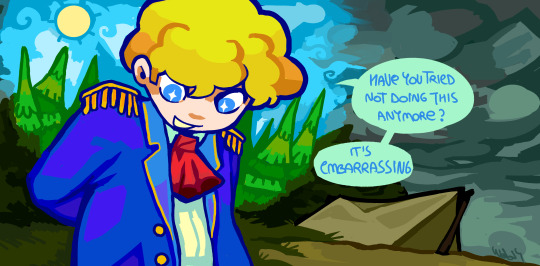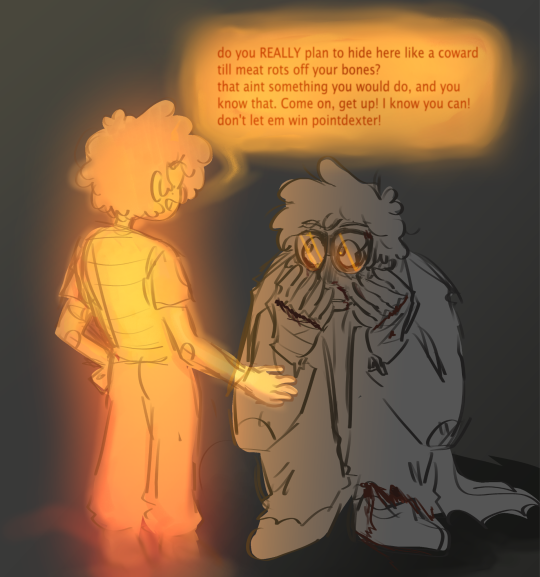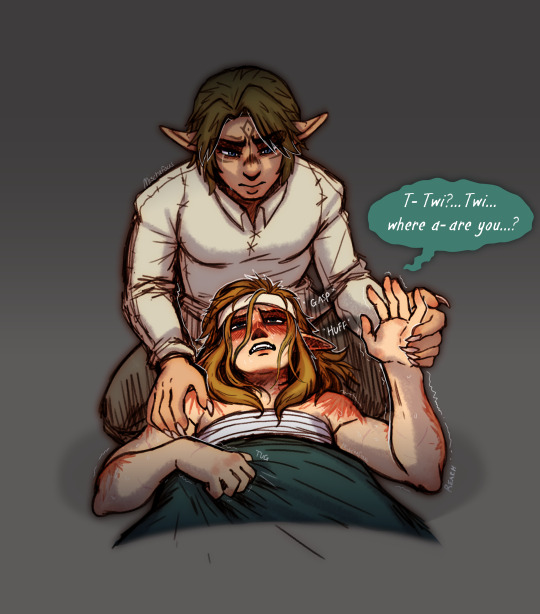#hallucinations
Explore tagged Tumblr posts
Text
Hallucinations: a DPxDC prompt.
Dick knows he has hallucinations.
He’s been seeing things ever since Littlewing died.
At first he’d see Jason out of the corners of his eyes.
Next thing he knew he was having full blown conversations with his dead brother.
A part of him hoped he had “The Gift” as Madame Zelda had always called it, a gift she and other Romani possessed. The ability to see the unseen. The spirits of the dead.
For a time Dick convinced himself he had “The Gift”
It was the only think that could explain the floating Robin and other odd things he saw.
Then Red Hood revealed himself.
Dick figured out pretty quickly that there was no way there could be a ghost Jason and a living Jason at the same time.
Hence, he was hallucinating.
Dick tried ignoring his hallucinations and after a while Jaybin stopped showing up.
So why was he back.
Why was his hallucination begging him to help him.
Why was his hallucination covered in Lazarus green bloodstains and holding onto a kid with glowing white hair and whose organs Jaybin was barely keeping inside the kids body.
Why was his hallucination suddenly visible to everyone else?
#dick grayson#romani dick grayson#Jaybin#hallucinations#dick can see ghosts#he thinks they are hallucinations#now ghost Jason is bringing a vivisected teen to him and asking for help#dpxdc#dp x dc#dc x dp#dcxdp#writing prompts#dpxdc prompt#dp x dc prompt
42 notes
·
View notes
Text



tfw a hallucination of your idealized younger self calls you a fucking loser
13K notes
·
View notes
Text
Tim: Hwoah boy, we're really in it now, Jason
Jason's memorial case:
Tim: Ahahaha! You're so funny, Jason!
Jason's memorial case:
Tim:
Tim: I should probably see a professional when I'm done fixing Bruce.
#tim drake#red robin#robin#chaotic tim drake#unhinged tim drake#hallucinations#jason todd#memorial case#jason todd memorial case#bruce wayne
3K notes
·
View notes
Text
DISCLAIMER: I HAVE NO CLUE IF THIS IS MEDICALLY ACCURATE
Something that whump writers don’t consider:
IVs feel cold. Can you imagine a room temperature liquid going directly into the bloodstream of someone who’s 97-104 degrees? It’s hellish. You can’t get warm no matter how much external heat you receive.
Imagine a delirious whumpee whimpering and clawing at an IV while being restrained and reassured by Caretaker.
“No no no, that stays in”
“Hey, hey. I know it hurts, but it’ll help you feel better”
Maybe the whumpee’s hallucinating, thinking that they’re being tortured. When Caretaker’s words fail to get through, they have to use gentle touches and singing. Or, if you want to be mean, you can have the Caretaker being forced to restrain Whumpee to prevent them from hurting themselves until they run out of energy and pass out.
#tw blood#tw medical#tw iv#whump#physical whump#whump prompt#whump tropes#whumpblr#whumpee#illness whump#sick whump#fever whump#cold whump#whump inspiration#medical whump#emotional whump#whump writing#whump community#whump scenario#whump ideas#sicknario#hurt/comfort#fainting whump#hallucinations#caretaker#sickfic
1K notes
·
View notes
Text
Dick, Tim, Bruce they all hallucinate. And the angst of it is insane but let's talk a bit more about the comfort.
They read each others files they know certain things happen helping each other instead of hurting.
Jason noticing Dick is staring off to the side, his brother getting anxious. He gently moves in front calling him. "Hey dickie whatever you seeing isn't real, it's alright."
Dick who prefers you to remind him it's all in his head.
Damian who walked down to the cave Tim is having an active conversation with the wall. Calling over to him, "Drake let's move to your room, I have a drawing to show you." Leading him by the hand and staying with him.
Damain and Jason both leaving animals specifically with Tim and Dick are after they noticed them relying on the animals not moving or twitching to help decide if something is actually there.
Dick interrupting a panicked Bruce who is seeing a blood covered Jason. Gently steering him to his room, laying down to watch a movie.
It's not abnormal for Tim to grab Jason, Damian or even Dick on a good day to ask if they see anything.
A quick call out of "Anyone else seeing this?" Is expected.
Code words change by the day between them.
Sometimes none of it works but just staying with them until whatever passes.
Bruce who isn't as obvious but will attempt to find Alfred, Jason guides.
Dukes powers doing wonders to help because if he's not seeing it you defiantly aren't.
A movie night interrupted by a panicked Dick asking if anyone else can hear that. Jason and Tim working to ground him.
It's unsetting for Jason, Damian, and Duke but it's absolutely terrifying for them doing everything they can to help.
It's worse though because sometimes it's just voices, or Tim feeling like there's bugs all over him, swearing Alfred the cat was just in here but he's safe in Damian's arms. Working together to try and make it just a bit easier for them.
#jason todd#tim drake#dick grayson#bruce wayne#damian wayne#duke thomas#batfamily#batfam#batman#dc#dc comics#hallucinations#tw hallucinating#good sibling Jason#good sibling dick grayson#good sibling Tim#good dad Bruce#batfamily is a clusterfuck#is this based off me Twenty minutes ago maybe but it's scary
862 notes
·
View notes
Text
Me and @ridokichan -s headcanon about "isolation-induced hallucinations" with Stan twins.
First experience with the portal was definitely..... Insufferable. For both of them.
At least someone's looking out after them.


#FIRST ART BELONGS TO RIDOKI!!! FOLLOW EM#my part kinds cringe but this whole thing was unexpected and for funsies#they suffered enough#life can't even let them catch a break#stan would be clinging to this image of his little brother still being aeound while Ford would histerically try and push lee away#thinking it's one of bills shenanigans#little does he know it's just his head playing tricks on him#not bill.#the image of childhood of one another forever will remain as something pure#gravity falls#stanley pines#stanford pines#stan twins#angst#bill cipher#kings of new jersey#hallucinations#comfort#little sun and moon that they are#my lovelies#tumblr fyp#fyp#sketch#art#Delusion!AU#Delusion!lee#Delusion!six#Delusion!Stan#Delusion!Ford#Twin!Delusion AU
740 notes
·
View notes
Text
Happy disability pride month to the undiagnosed. To the people lying in bed, in fatigue or pain, unexplained because their doctors ignore them or don't believe them.
To the people who're suffering but don't have the answers as to why, to the many more that think their suffering is normal because it's been going on for so long or they were thought to be exaggerating when describing symptoms.
I suffered from a chronic illness for years because my doctor, and nurse practitioner, ignored me when I said I was fatigued constantly. It's a miracle I was diagnosed by that nurse practitioner at all.
And I've been living with tactile hallucinations my whole life, but was brushed off in my childhood when I tried to tell people I feel bugs crawling on me when they're not there. (Before I get any comments - believe me. This is disabling. I'd be constantly paranoid without my antipyschotics, and in a way I still kind of am.)
Our doctors often fail us in many ways, even though they're supposed to help us, and in certain countries we even have to PAY large amounts to get ignored by these doctors.
If you relate to my story, I'm sorry. I hope we can both find better luck from the places that're supposed to help us in the future.
#butchy babbles#disabled#disability#invisible disability#disabilties#actually disabled#actually psychotic#hallucinations#tactile hallucinations#formication#disability pride month#disability month#chronic illness#chronic fatigue#chronically ill#blossomed to 1k#blossomed to 100
1K notes
·
View notes
Text
Even though the hallucinations and delusions psychotic people experience aren't objectively real, they are often experienced as if they were real, and they can easily be just as scary and traumatizing as any "real" traumatic experience
1K notes
·
View notes
Text
Odysseus is awake for nine days, right, and probably a very short nap
So basically I’m hearing that when Poseidon jogs up and gets all in their faces, Odysseus is almost definitely seeing the Hat Man do a little shimmy and the Charleston right on deck also
#epic the musical#odysseus#hallucinations#nine days#epic the ocean saga#keep your friends close#keep your enemies closer#that song was catchy as FUCK by the way
1K notes
·
View notes
Note
Saw you wanted whump-y LU requests, and I wanted to suggest maybe a piece of either Wild or Twilight being sick, and hallucinating that the other isn’t there, when they actually are? Or something along those lines?
Hope you have a wonderful day!
I really enjoyed drawing the expressions on this one! poor Wild is super sick and delirious to the point where he is hallucinating that everyone is gone 😭
Thank you for your lovely request @four-eyed-nerd! I hope you have a wonderful day too💙

HSAJFJSHKW- LOVE IT WHEN I DRAW HANDS AND THEY LOOK LIKE PROPER HANDS
#linked universe#linkeduniverse#lu#my art#lu fanart#lu whump#lu wild#lu twilight#cw whump#whump art#sick#delirious#hallucinations#sick whump#hero of the wild#hero of twilight#art requests#proportions are slightly off...#hurt/comfort#digital art#sick whumpee#i love this duo
1K notes
·
View notes
Text
If people in general can understand that someone watching a horror movie might jump in their chair, have their heart rate go up, and feel nervous, even though there is no actual threat in the room, then why can't they understand the same is true for people experiencing psychosis?
They are similar, you are seeing something that isn't actually real, you may believe it's real or not, but either way you will react as if it were real because your brain can't help it. The difference is the person in psychosis isn't seeing it through the safety of a screen, isn't prepared for it and can't immediately turn it off if they want to.
So why is it so hard for people to understand why people in psychosis will react like they are actually experiencing something? Anyone would jump back if an elephant suddenly appeared in front of them. Or be very nervous if they hear their name called when they are home alone. So why are people in psychosis expected to not react, or stop reacting when someone tells them it isn't real?
It really shows a lack of sympathy from people who haven't experienced psychosis, for them to expect us to not have reactions. We are expected to somehow suppress our brains natural reactions, simply for other people's comfort. This applies even more to people of color and homeless people. We are expected to fit the status quo, even when our brains are experiencing something as real.
I say all this to say, try to consider the experience of people with psychosis if you haven't. Don't gawk at people reacting to something you don't see. Try not to fear the homeless person talking to someone that isn't actually there. Don't make fun of, or judge people for reacting to something they are experiencing, just because you don't experience it.
#schizophrenia#mental illness#nd#neurodivergent#schizophrenic#psychosis#actuallyschizophrenic#mental health awareness#pseriouslypsychotic#hallucinations#delusions#schizophrenia awarness#psychosis awarness
1K notes
·
View notes
Text
Hallucinations in BPD:
1. Hearing people call your name
2. Phone vibrations/phone ringing
3. People laughing/talking about you
4. Bugs that aren't there
5. Shadow people
#bpd feels#bpd mood#bpd problems#bpd thoughts#bpd vent#actually borderline#actually bpd#borderline personality disorder#depressing shit#living with ptsd#hallucinations#borderline thoughts#sorry for being depressing#bpd#bpd splitting#bpd stuff#bpd blog#bpd culture is#bpd shit#bpd tag#bpd things#bpd traits#bpd triggers
564 notes
·
View notes
Text
EURYLOCHUS: “Hey Captain, I’m worried about how since we got that bag you’ve…you know…stopped sleeping? I was thinking maybe I should take a turn so you can…Captain? Hello?”
ODYSSEUS: (turns to him excitedly) “Penelope?”
EURYLOCHUS: (taking a step back) “Um, no, sir, it’s just me.” (looks closer) “By the Gods, man, you look awful!”
ODYSSEUS: (hallucinating like no tomorrow) “I can’t wait to make some new memories!”
EURYLOCHUS: “Yeah, we’re all excited to get home. Listen. Captain. You really need some sleep.”
ODYSSEUS: “Telemachus!” (tries to hug him)
EURYLOCHUS: (dodges) “Captain, can you even hear me right now?”
ODYSSEUS: “Time for me to be the father I never was.”
EURYLOCHUS: “Captain! Snap out of it!”
ODYSSEUS: “Why are my eyes and my heart and my soul so heavy?”
EURYLOCHUS: “Because you haven’t slept in nine days. That’s it, this is ridiculous. I’ll watch the bag, you go rest.”
ODYSSEUS: “I keep on trying to embrace you both, why won’t you let me?”
EURYLOCHUS: (has an idea, in a falsetto) “You need to come to bed, Odysseus, love.” (slips an arm under his shoulder)
ODYSSEUS: (raving) “So much has changed, but I’m the same.” (flinging his arms around EURYLOCHUS)
(A group of MEN sneaks behind them, reaching for the bag while they’re distracted.)
EURYLOCHUS: (trying to lead ODYSSEUS to a cot) “Uh-huh, of course you are you, come on now.”
(MEN grab the bag and huddle excitedly around it)
EURYLOCHUS: “Seriously, Captain, you should have shared watch duties from the start. Nine days without sleep? Are you nuts?”
ODYSSEUS: (muttering incoherently) “I’m the same…”
(The STORM suddenly rages)
#this is totally how it happened#NINE DAYS#wtf Odysseus#“keep your friends close” doesn't mean “do it all yourself”#epic the musical#epic: the musical#epic: storm saga#odysseus#eurylochus#jorge rivera herrans#sleep deprival#hallucinations
981 notes
·
View notes
Text









Kraven the Hunter (2024): “The hallucinations are just the beginning. Are you seeing your worst nightmares?”
#kraventhehunteredit#whumpedit#kraven the hunter#whump#aaron taylor johnson#sergei kravinoff#shot#poisoned#hallucinations#panicking#fear#my gifs#movie#kraven the hunter spoilers
381 notes
·
View notes






